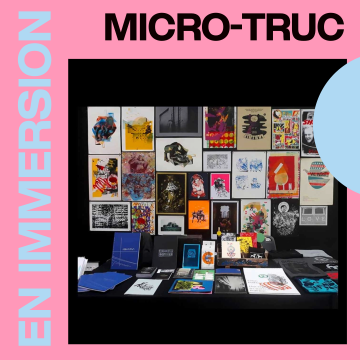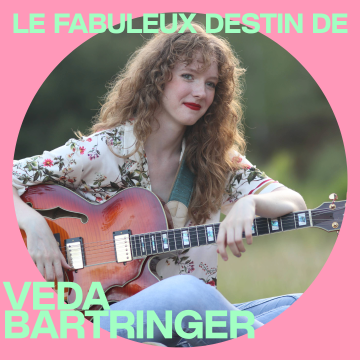11 avr. 2022Storytelling in Luxembourg: “It's a way to recognise that you've grown”
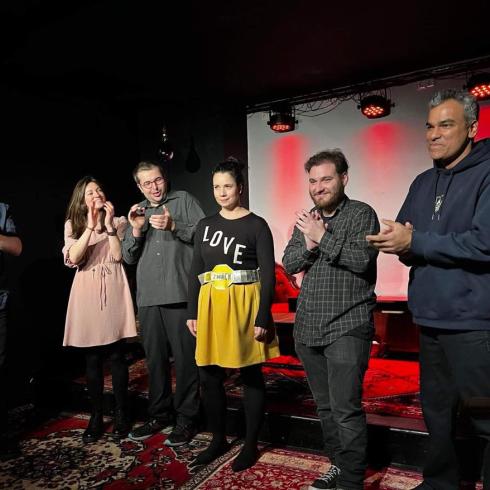
Canadian comedian Daniel Belkin has been bringing his storytelling nights to Luxembourg since January 2022. He explains what makes a story compelling and why it’s not just about comedy.
Tell us a bit about yourself.
I'm originally from the West Coast of Canada, Vancouver. The last two years before moving to Europe, I lived in Toronto. Both sides of Canada have had storytelling in addition to stand-up. I've always kind of dabbled. When I came to Berlin in 2021, I noticed that I really missed it. And there's no night for that in Berlin. That's when I started doing my own storytelling show. It was in October or November 2021.
Is there a strong storytelling tradition in Canada?
On the West Coast is where the First Nations Coast Salish people live, there is a storytelling tradition where they sit in a circle and pass a feather that you hold and you tell a story. When we were in school, we would go to the First Nations’ traditional cultural centre, and we would do that at least once a year.
What were you aiming for when you started storytelling nights in Europe?
It was basically like a night of comedic storytelling. When I first took it to Luxembourg, I did it as an open slam, just embracing storytelling without leaning on being funny. I invited one person who does spoken word to do it, another person who's a musician. And then I had somebody reach out to me who used to do storytelling in Amsterdam where they actually have a storytelling theatre. It hosts weekly storytelling shows, and has a storytelling school. They took the Persian tradition of storytelling, modernised it and made it their own.
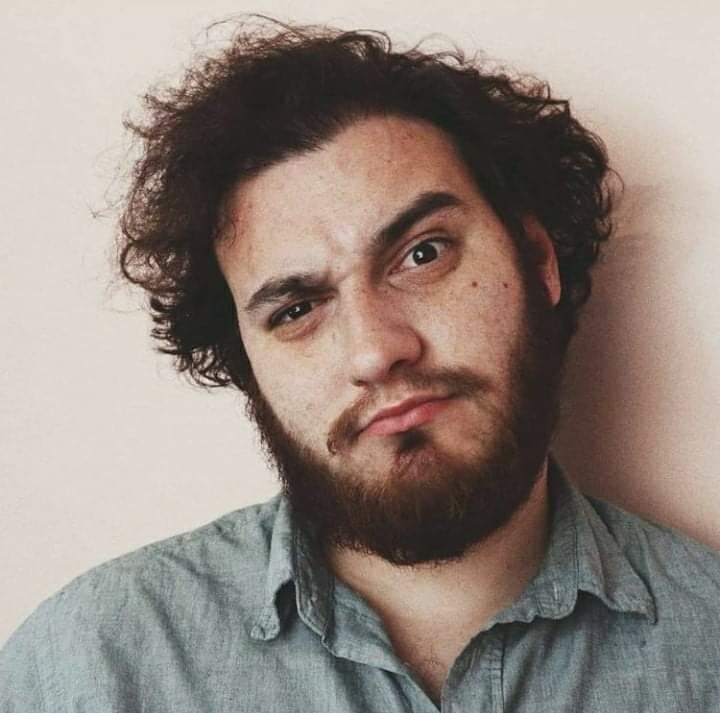
© Dan Belkin
What advice do you give to storytellers speaking at Thick Plots, the Luxembourg show?
Tell your truth. Obviously, you might not be able to remember every detail and you might want to make up the parts that you don't know for sure. You can't research every character in your story. You might not be able to contact those people, you might have lost touch with them. But, try to be honest and try to tell it as truthfully as you can.
In your experience, what are the common traits in the stories that won in the Luxembourg slam shows?
We've had three winners so far in the slam format in Luxembourg. We had one that was comedic and two that were serious. If there was one common thing that I noticed in all three of them, it was that there's a very strong point of view, and how the performer felt in the time period that they're talking about.
Nicolas Calmes did a poem from the perspective of his bully, about events that took place and of him getting bullied. So it's more of an art piece, but the narrative is there in the background. And the humanising point of view that he takes from his bully’s perspective is very clear.
The second story was a comedy routine and again, it had a very strong point of view of someone going through a divorce. In the last one, there was a Ukrainian woman recounting the last 10 days of her life: her daily routine, and the types of conversations that she was having.
What I've learned so far is that there isn't really a strict beginning, middle and end structure, because people can fill in the gaps. But, what they cannot fill in is where you are coming from: what's your point of view? If they can relate to your point of view and empathise with it, they'll fill in the parts that are missing from the story.
What’s the story you like to tell the most?
I have one story that is funny in moments but also is not that funny. It’s about how I used to be in a theatre school when I was a kid and there was a clash between the head teacher and all the kids. So, we shaved our heads to donate our hair to a cancer charity, the weekend before the show was due to open. We all turned up to the school bald. It's not a hilarious story, but it was such a coming-of-age time in my life, challenging authority. And so I really connect to that story and it feels empowering to tell it.
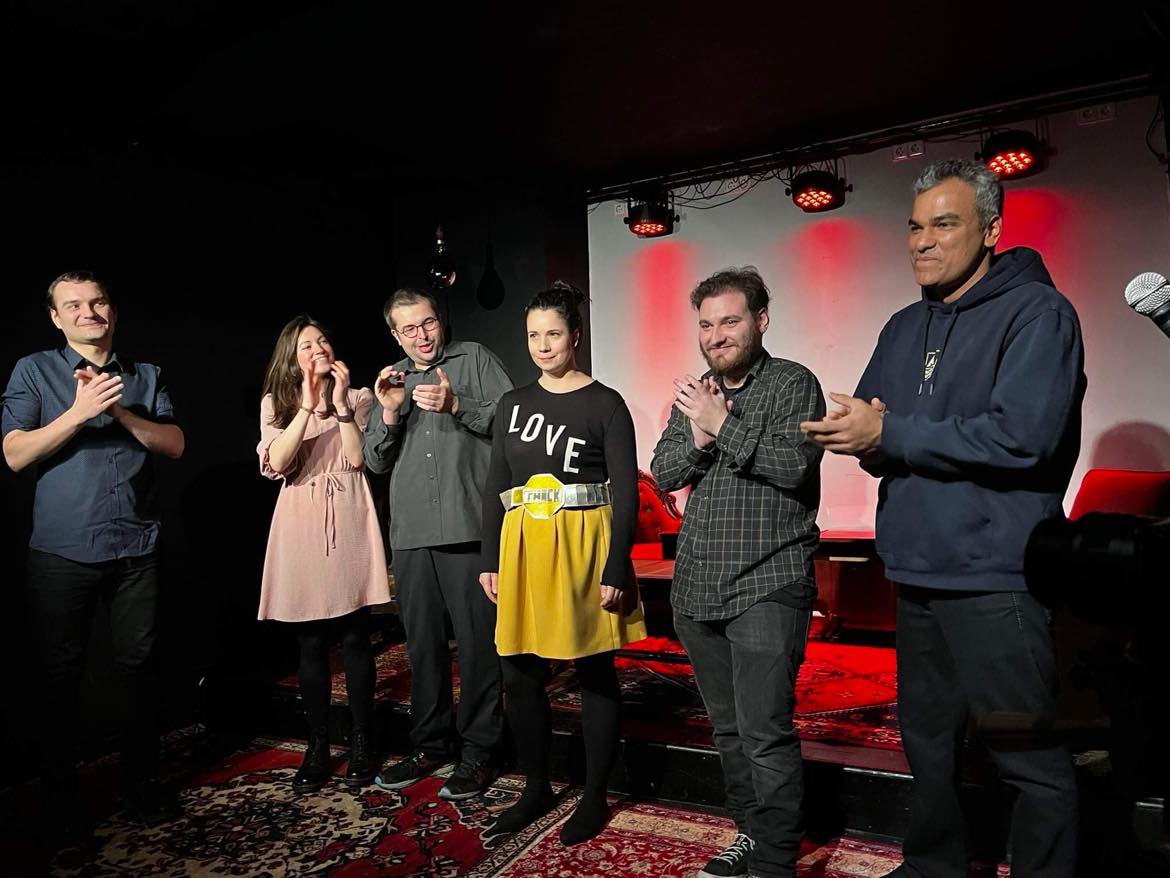
The second Thick Plots Slam storytelling night in Luxembourg at Rocas © Dan Belkin
Do you have a storytelling tradition in your family?
In a way. Everyone in my family is either writing poems or some sort of stories or narratives. My grandpa writes a lot. He's not a performer per se, but he has a lot of stuff written. On my mom's side, my grandma also wrote poems and stories. We helped my grandma publish a book of poems and stories that she wrote, for her birthday. She loved that I would read her stories.
What do you personally get out of storytelling that you don’t necessarily find in stand-up?
Sometimes, it's a way to recognise that you've grown and you're no longer certain characters. Sometimes people tell stories of something they've done. In Canada, I remember hearing a guy tell a story about a time they went to jail. You can tell that they're no longer the person they are in the story. So there's such a dynamic nature to presenting yourself as a real person who's capable of more than one or two things and to be able to go from one and then change into another. I feel that’s hard to do in straight stand up because you're just kind of presenting like, one slice, and then we leave it there and l jump to the next thing.
Who are the storytellers that you love?
Mike Birbiglia. He had a special called My girlfriend's boyfriend, a one-hour narrative that he breaks out into bits at different points. Everything feeds back into the narrative at the end. And so you can see him going through a change. Louis CK has a great story about him going to Russia at the fall of the Soviet Union.
He was able to go to Moscow for a week and he's describing the poverty and how when he was waiting for the train there was a guy with his boot open. He wanted to glue it back together. Some homeless kids were running by so he just waved them down. And then the kids took out this glue from a pocket and they glued his boots back together. And then they ran off again. He had this moment where he understood that this guy instinctively knew that these kids would have glue on them because they're homeless kids and they're probably huffing glue, like this is a drug that they're addicted to.
It's such a tragic moment, but at the same time, the idea that this guy just had the convenience of flagging down these kids to fix his boots. So it was a kind of comedic observation and in that moment, it made him laugh. It broke the depression that he felt all week while he was in Moscow, observing this poverty.
To what extent do you think that storytelling creates a connection between people?
I think naturally, people who come to an environment to be part of a show are empathetic people, even if it's just a comedy show, not a storytelling one. In a storytelling environment, it just gets magnified. If somebody is really opening up and saying something that's tough to open up about, you feel it much more than if they had spoken about it on a podcast, for instance. It really stays with you and you understand that person in a much more intimate way. Every person is in that moment, trying to empathise and understand and relate.
Catch Thick Plots on 11 and 19 April at Rocas, rue des Bains, 8pm. Daniel Belkin is a regular improv performer with the Garage Gang. You can find him on his Facebook page Dan Belkin Comedy.
Les plus populaires
- 20 juil. 2023
- 04 avr. 2024
- 27 mar. 2024
- 26 mar. 2024
ARTICLES
Articles
19 avr. 2024Micro-Truc
Articles
15 avr. 2024TAKEOVER – METAL EDITION
Articles
12 avr. 2024